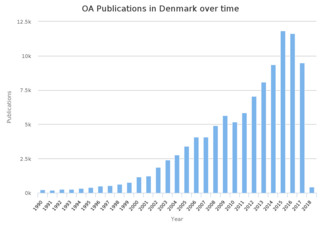
The Georgetown University Law Center is the law school of Georgetown University, a private research university in Washington, D.C., United States. It was established in 1870 and is the largest law school in the United States by enrollment and the most applied to, receiving more full-time applications than any other law school in the country.

The University of Pittsburgh Press is a scholarly publishing house and a major American university press, part of the University of Pittsburgh. The university and the press are located in Pittsburgh, Pennsylvania, in the United States.
PubMed Central (PMC) is a free digital repository that archives open access full-text scholarly articles that have been published in biomedical and life sciences journals. As one of the major research databases developed by the National Center for Biotechnology Information (NCBI), PubMed Central is more than a document repository. Submissions to PMC are indexed and formatted for enhanced metadata, medical ontology, and unique identifiers which enrich the XML structured data for each article. Content within PMC can be linked to other NCBI databases and accessed via Entrez search and retrieval systems, further enhancing the public's ability to discover, read and build upon its biomedical knowledge.
The University of Pittsburgh School of Law is the law school of the University of Pittsburgh, a public research university in Pittsburgh, Pennsylvania. It was founded in 1895 and became a charter member of the Association of American Law Schools in 1900. Its primary home facility is the Barco Law Building. The school offers four degrees: Master of Studies in Law, Juris Doctor, Master of Laws for international students, and the Doctor of Juridical Science. The school offers several international legal programs, operates a variety of clinics, and publishes several law journals.

Jessica Litman is a leading intellectual property scholar. She has been ranked as one of the most-cited U.S. law professors in the field of intellectual property/cyberlaw.

The Public Knowledge Project (PKP) is a non-profit research initiative that is focused on the importance of making the results of publicly funded research freely available through open access policies, and on developing strategies for making this possible including software solutions. It is a partnership between the Faculty of Education at the University of British Columbia, the Canadian Centre for Studies in Publishing at Simon Fraser University, the University of Pittsburgh, Ontario Council of University Libraries, the California Digital Library and the School of Education at Stanford University. It seeks to improve the scholarly and public quality of academic research through the development of innovative online environments.
Pittsburgh is home to the first commercial radio station in the United States, KDKA 1020AM, the first community-sponsored television station in the United States, WQED 13, the first "networked" television station and the first station in the country to broadcast 24 hours a day, 7 days a week, KDKA 2, and the first newspaper published west of the Allegheny Mountains, the Pittsburgh Post-Gazette.

Clifford Lynch is the director of the Coalition for Networked Information (CNI), where he has been since 1997. He is also an adjunct professor at Berkeley's School of Information.

Edward Elgar Publishing is a global publisher of academic books, journals and online resources in the social sciences and law. The company also publishes a social science and law blog with regular contributions from leading scholars.

James G. Neal is an American librarian, library administrator, and a prominent figure in American and international library associations. In 2022 President Joe Biden appointed him to the National Museum and Library Services Board which advises the agency on general policies with respect to the duties, powers, and authority of the Institute of Museum and Library Services relating to museum, library, and information services, as well as the annual selection of National Medals recipients.
Bernard Hibbitts is a Canadian lawyer, law professor, academic entrepreneur, editor and publisher currently teaching in the United States at the University of Pittsburgh School of Law. Trained as a legal historian, his early work focused on the historical relationship between law, technology and the senses. In the mid-1990s he wrote a series of controversial articles on the future of law reviews and scholarly publishing in the then-just-emerging age of the Internet. He is best known today as the founder, publisher & Editor-in-Chief of JURIST, the Webby award-winning online legal news service he created in 1996 that is now powered by a volunteer team of over 80 students from 29 law schools in the US, the UK, continental Europe, Kenya, Mauritius, Australia and New Zealand. He is Chairman of the Board of Directors of JURIST Legal News and Research Services, Inc., the 501(c)(3) non-profit corporation he organized to operate JURIST in 2008.
The University of Pittsburgh Law Review is a journal of legal scholarship edited by an independent student group at University of Pittsburgh School of Law and published by the D-Scribe Digital Publishing program at the University Library System, University of Pittsburgh. The Review is published quarterly, with recent issues available online. It is one of the 40 most-cited law reviews in the country. As of 2006, the Review received the 34th most submissions of all Law Reviews.
The Journal of Law and Commerce is a law review published by an independent student group at the University of Pittsburgh School of Law, focusing on domestic and international commercial and business law. The journal is published biannually, with recent issues available online. The journal is published by the University Library System at the University of Pittsburgh as part of its D-Scribe Digital Publishing program.
The Pittsburgh Journal of Environmental and Public Health Law was a law review edited by an independent student group at University of Pittsburgh School of Law, focusing on environmental law and public health. The journal was established in 2006 and was published annually by the University Library System as part of its D-Scribe Digital Publishing program. Three issues were produced in 2011 and the journal became biannual after that. The last issue appeared in 2014. The journal is abstracted and indexed in HeinOnline.
An open-access mandate is a policy adopted by a research institution, research funder, or government which requires or recommends researchers—usually university faculty or research staff and/or research grant recipients—to make their published, peer-reviewed journal articles and conference papers open access (1) by self-archiving their final, peer-reviewed drafts in a freely accessible institutional repository or disciplinary repository or (2) by publishing them in an open-access journal or both.

D-Scribe Digital Publishing is an open access electronic publishing program of the University Library System (ULS) of the University of Pittsburgh. It comprises over 100 thematic collections that together contain over 100,000 digital objects. This content, most of which is available through open access, includes both digitized versions of materials from the collections of the University of Pittsburgh and other local institutions as well as original 'born-electronic' content actively contributed by scholars worldwide. D-Scribe includes such items as photographs, maps, books, journal articles, dissertations, government documents, and technical reports, along with over 745 previously out-of-print titles published by the University of Pittsburgh Press. The digital publishing efforts of the University Library System began in 1998 and have won praise for their innovation from the leadership at the Association of Research Libraries and peer institutions.
The following is a timeline of the international movement for open access to scholarly communication.

Open access to scholarly communication in Denmark has grown rapidly since the 1990s. As in other countries in general, open access publishing is less expensive than traditional, paper-based, pre-Internet publishing.

In India, Open Access movement started in May 2004, when two workshops were organized by the M S Swaminathan Research Foundation, Chennai. In 2006, the National Knowledge Commission in its recommendations proposed that "access to knowledge is the most fundamental way of increasing the opportunities and reach of individuals and groups". In 2009, the Council of Scientific & Industrial Research (CSIR) began requiring that its grantees provide open access to funded research. In 2011, the Open Access India forum formulated a draft policy on Open Access for India. Shodhganga, a digital repository for theses, was established in 2011 with the aim of promoting and preserving academic research. The University Grants Commission (UGC) made it mandatory for scholars to deposit their theses in Shodhganga, as per the Minimum Standards and Procedure for Award of M. Phil./Ph.D. Degrees Regulations, 2016.Currently, the Directory of Open Access Journals lists 326 open access journals published in India, of which 233 have no fees.









